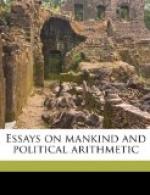There was in Petty’s time no direct numbering of the people. The first census in this country was not until more than a hundred years after Sir William Petty’s death, although he points out in these essays how easily it could be established, and what useful information it would give. There was a census taken at Rome 566 years before Christ. But the first census in Great Britain was taken in 1801, under provision of an Act passed on the last day of the year 1800, to secure a numbering of the population every ten years. Ireland was not included in the return; the first census in Ireland was not until the year 1813.
Sir William Petty had to base his calculations partly upon the Bills of Mortality, which had been imperfectly begun under Elizabeth, but fell into disuse, and were revived, as a weekly record of the number of deaths, beginning on the 29th of October, 1603; notices of diseases first appeared in them in 1629. The weekly bills were published every Thursday, and any householder could have them supplied to him for four shillings a year. These essays will show how inferences as to the number of the living were drawn from the number of the dead. And even now our Political Arithmetic depends too much upon rough calculations made from the death register. It is seven years since the last census; we have lost count of the changes in our population to a very great extent, and have to wait three years before our reckoning can be made sure. The interval should be reduced to five years.
Another of Sir William Petty’s helps in the arithmetic of population was the Chimney Tax, a revival of the old fumage or hearth-money— smoke farthings, as the people called them—once paid, according to Domesday Book, for every chimney in a house. Charles the Second had set up a chimney tax in the year 1662; the statistics of the collection were at the service of Sir William Petty. The tax outlived him but two years. It was promptly abolished in the first year of William and Mary.
The interest taken at home and abroad in these calculations of Political Arithmetic set other men calculating, and reasoning upon their calculations. The next worker in that direction was Gregory King, Lancaster Herald, whose calculations immediately followed those of Sir William Petty. Sir William Petty’s essays extended from 1682 until his death in 1687. Gregory King’s estimates were made in 1689. They were a study of the number population and distribution




